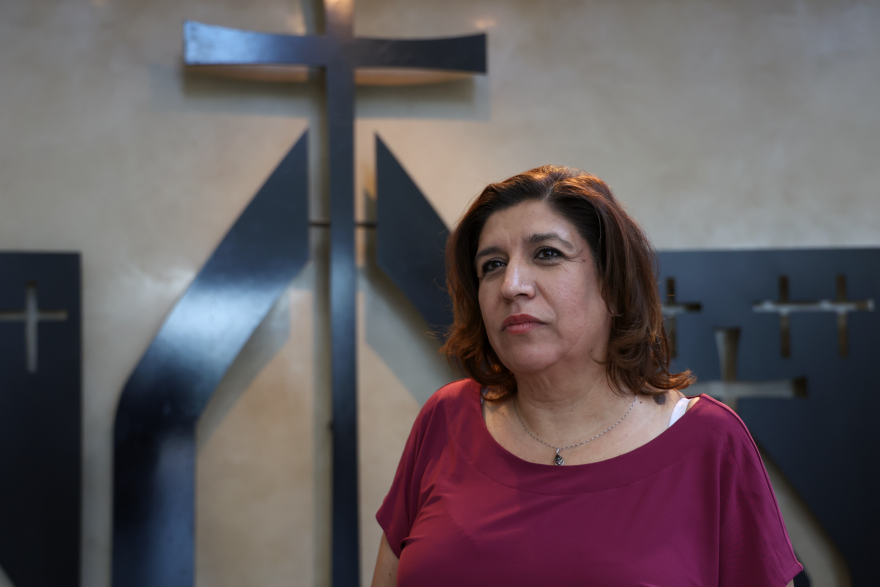Darlington Okopu’s number one priority has always been taking care of his teenaged twins. Originally from Ghana, he has lived in North Texas for the better part of a decade. And he built a good, stable life for his family before the pandemic, working a job assembling car parts in Arlington.
Okopu says he first started feeling the pandemic’s impact at work.
“People were not coming. You ask about them. ‘Hey, he got infected,’” he recalled. “Then you hear someone has died. So it became very scary.”
Then, work hours were cut and shifts were staggered out. In short order, he says the warehouse closed down.
After he was furloughed, Okopu didn’t qualify for unemployment because of his immigration status. He’d gotten his green card shortly before the pandemic and hadn’t worked long enough to qualify for benefits from the Texas Workforce Commission. As other pandemic assistance was approved by the federal government, he found a lot of it similarly out of reach.
Although he quickly found another job, it wasn’t consistently full-time, and he started racking up credit card debt to keep afloat.
“It was very tough, very tough,” he said. “And it got to a point in time where I just picked three things out of my life: How to get money to pay my rent, to pay my light bill, to keep my car moving. That’s what’s going to keep my kids for me.”
‘A lot of it hit in our community’
Okopu did manage to keep his kids housed and fed and the lights on. He avoided having his car repossessed, which allowed him to keep working. But it cost him: In all, Okopu says he racked up about $18,000 in credit card debt.
On the whole, Americans paid down credit card balances in the first year of the pandemic, flush with stimulus payments and unable to spend on restaurants and vacations. But amid that average decline, 30% of credit card holders saw their balances increase, especially parents of kids under 18, Millennials and low-wage workers.
Navigating the pandemic was stressful, and Okopu realized he was largely on his own to figure out how to care for his kids. The rest of his family is still in Ghana, so he couldn’t lean on them for support. And his close-knit church family in North Texas was in no position to help, either.
“Eighty or 90% of them were also going through the same challenges,” or worse, he said. “You call somebody, they tell you he is dead. You call somebody hey, Thomas had COVID, he’s dead. A lot of it hit in our community.”
His lifesaver, though, came in the form of help from Catholic Charities Fort Worth. The organization helped him pay some bills, but it also assigned him a financial coach to help him chart a path through uncertain times.
Myrna Robles, his caseworker, says Okopu is just one of so many people still digging out of the hole the pandemic blew in their finances.

“It’s incredibly stressful to see a person like Darlington, to hear him say, ‘I’ve never been through this before. I’ve never not been able to pay my bills. I’ve never been late on my rent,’” Robles said.
Rebuilding after setbacks
Before COVID-19 hit, Robles’ clients at Catholic Charities were mostly working, had stable housing, and were keeping up with their bills, but worked with her to build greater financial security. The pandemic unraveled progress for so many families, she said, sending clients into survival mode.
“The majority of my clients on my caseload have increased their debt exponentially, have taken payday loans – what I call predatory loans – and are just drowning in the stress of either not being able to pay those loans, not being able to pay those credit cards, maxing out their credit cards and still not being able to make it,” she said.
Robles says it will take years for people to dig out of the debt they took on to survive the pandemic. Some will likely never pay off their debt. But in addition to the debt, she thinks the trauma is still shadowing her clients.
Darlington Okopu, though, is on a firmer financial footing now, paying down his debt as fast as he can.
He credits the help from Catholic Charities for getting him through the worst of the pandemic, helping him in big and small ways by connecting him with rental assistance, even helping get back-to-school items for his kids.
Okopu took a job at the post office and hopes to get full time status and benefits soon. Already, he’s been able to pay off two credit cards, and his credit score has gone up more than a hundred points.
But like many North Texans, Okopu’s finances are partly at the mercy of the hours available at work.
“Last year, at Thanksgiving, we had a lot of hours at the post office, so I had more hours,” he said. “I used that opportunity to pay a little more than the minimum payment. After Christmas, hours started dropping, so I am back to the minimum payments again.”
Still, he is happy with the progress and sees more success coming.
“It’s a matter of time. This too shall pass,” he told his kids in the worst of the pandemic. “And gradually, we’re passing through.”







